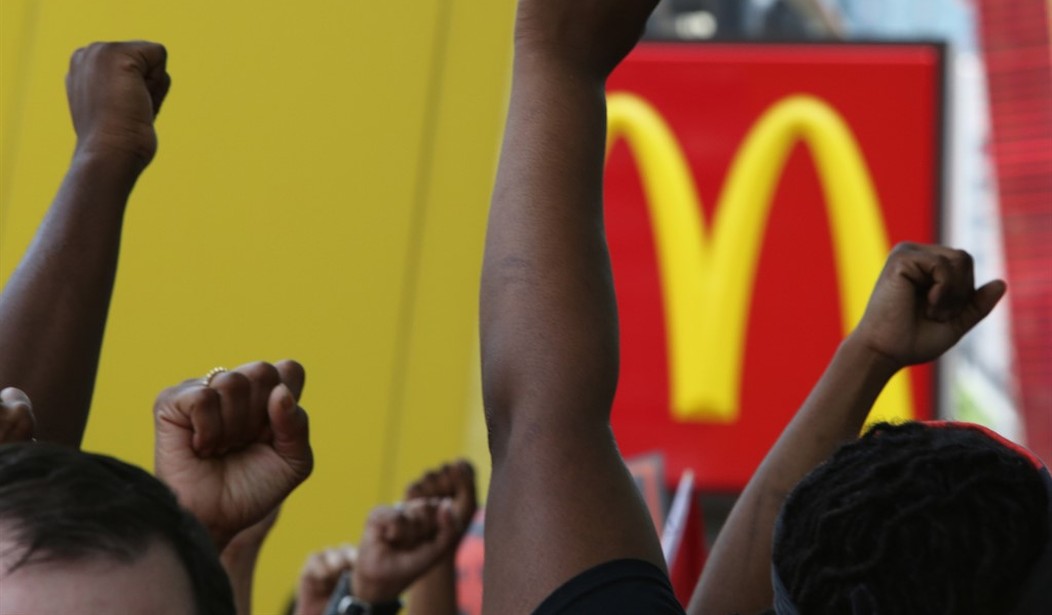Editor's note: This column was authored by Amelia Irvine.
In 2012, a few hundred fast-food workers in New York City went on strike to demand a pay raise, and the activist rallying cry #Fightfor15 was born. Seven years later, the movement has found success in California, the District of Columbia, New York City, Massachusetts, and New Jersey and the minimum wage is set to rise in two more states: Maryland and Pennsylvania.
But a $15 minimum wage is a foolish, ill-advised policy, and the workers in these states would actually be better off without it.
The debate over the economic impact of minimum wage laws is heated and complex, but economists agree on a few economic truths. First, a higher minimum wage is more likely to kill jobs if consumers can substitute the item that workers produce for an alternative. This stems from a simple, yet often unappreciated fact: firms only employ workers to produce something that people want to buy.
McDonald’s does not hire people because it wants to inject economic growth into local communities. Rather, it employs people in response to its customers’ demand for hamburgers. If the price of those hamburgers increases because higher wages have pushed up the cost of business, consumers will likely purchase fewer hamburgers—perhaps instead opting for a TV dinner or a better-valued burger at a fast-casual chain—and McDonald's will suddenly not need to employ so many people. The same workers the government intended to help with higher wages might find themselves out of a job entirely.
Like fast-food workers, brick-and-mortar retail employees are also vulnerable to these unintended consequences. With the rise of online retailers like Amazon, customers can easily take their business elsewhere when prices increase, and employees could lose their jobs as a result.
Recommended
Another economic reality is that if employee wages are a large share of a business’s expenses, then the minimum wage is more likely to lead to high job losses. Employees who provide services, rather than material goods, are more likely to fall into this category. When a woman pays upwards of $100 for a haircut, the bulk of costs are not spent on ounces of shampoo or spritzes of hairspray, but on the hairstylist’s paycheck. If that hairstylist must be paid more per haircut, that cost will likely be passed onto consumers. As before, women will get fewer haircuts, and more hairstylists will be out of work.
Finally, economists agree that if a company can replace employees with machines, and if companies that produce machines are ready to amp up machine-production, low-skilled workers are more likely to suffer after a minimum wage increase. It’s no surprise that with minimum wage laws on the rise, self-serve kiosks have appeared in fast-food restaurants, movie theaters, and convenience stores, relegating employees to food preparation, cleaning—or the job search. New technology is not a bad thing in itself, but employees would be better off if the transition toward automation was slower and driven by free-market forces, not government pressure.
But even if a higher minimum wage did not cause a single worker to lose his job, minimum wage legislation is still ineffective as an anti-poverty measure. Less than three percent of workers in the United States make the minimum wage, and more than half of these workers are younger than 25. And despite progressives’ insistence that minimum wage workers work 40-hour weeks without being able to scrape by, only one percent of full-time workers make the minimum wage.
Minimum wage increases may put more money in a lucky few high schoolers’ pockets, but they won’t pull families out of poverty. If anything, minimum wage advocates could hurt the workers they intend to help by taking away the one thing that could get actually them out of poverty—their job.
Amelia Irvine is a Young Voices contributor studying economics at Georgetown University. Follow her on Twitter @ameliairvine3.

























Join the conversation as a VIP Member